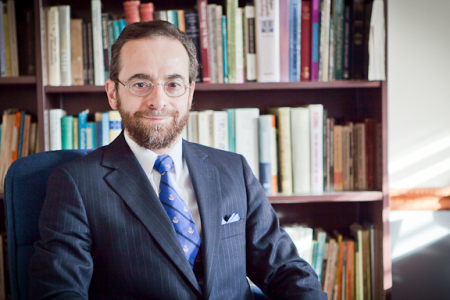What Does the Bible Say About Trans-Gender Identity?

Last month, a professor and former dean of theology who changed gender identities argued that the Bible defends those who renounce their birth gender, while a leading biblical expert on homosexuality said it condemns them as an "abomination."
"I was dying last year because I couldn't live that way anymore. .. I tried to be the best Christian woman I could be and today I get to be the best Christian I can be and the best person I can be," Heather Ann Clements, former head of the theology department at Azusa Pacific University (APU) in Los Angeles, Calif., said in a sermon proposing a biblical defense of transgender identity. During that sermon, he came out as a transgender man, Heath Adam Ackley. Embracing his identity as a man, he claimed it empowered him to love God and others more.
"The writers of Scripture viewed any attempts at overriding one's birth-sex as abhorrent, a sacrilege against the structures of maleness or femaleness created by God, and ultimately a rebellion against the Creator who made our bodies," retorted Robert A. J. Gagnon, an associate professor of New Testament at Pittsburgh Theological Seminary who is considered the foremost expert on the Bible and homosexuality. Gagnon addressed Ackley's arguments head on.
Biblical arguments for transgender identity
"Thirteen years I've been a member of this congregation and I've never preached – and I'm an ordained minister," Ackley said, introducing the sermon. "I was too scared, I couldn't do it, I was all blocked up. Scales were on my eyes and my mouth was plugged up and I was living in chains."
Throughout the sermon, and in an email statement to The Christian Post, Ackley laid out his argument that the Bible welcomes transgender people. He referred to three passages – one in Genesis, one in Matthew, and one in Galatians.
"Binary gender (division into male and female) isn't clearly defined with words such as 'man' or 'woman' until the twenty-second verse of the second chapter of Genesis," the transgender man wrote CP. Before that division, Genesis 2 refers to the first human as "ha'adam," the creature made of earth. For this reason, Ackley took on the name "Adam" to identify himself as a human before and beyond considerations of gender.
Ackley then turned to the Gospel of Matthew, where in chapter 19 Jesus refers to "natural-born eunuchs." This "is my own experience of gender as one who internally experiences male gender identity though I did not appear so at birth for visually obvious reasons," he explained.
"At this time, I sense God calling me to service to the Church in a teaching and preaching role and feel privileged to experience a life of prayer and study that is undistracted by the demands of married life," Ackley wrote. He did not say whether he would remain celibate for the rest of his life, but expressed his calling to ministry as overriding any sexual desires.
Ackley also cited Galatians 3:28, "There is neither Jew nor Greek, there is neither slave nor free, there is no male and female, for you are all one in Christ Jesus." In his sermon, he argued that men and women are incomplete after God separated the first man into two genders, and that in Christ both become complete by transcending gender itself.

Biblical arguments against transgender identity
Robert Gagnon, a scholar who has studied the related issue of the Bible's stance on homosexuality for 15 years, addressed each of Ackley's verses, but began by citing a different verse in 1 Corinthians. He pointed to 1 Corinthians 6:9, where the Apostle Paul includes a group called "malakoi" or "soft men" in a list of those "who will not inherit the kingdom of God."
The professor listed various groups in the ancient Biblical setting who attempted to transform their masculinity into femininity: assinnus, kurgarrûs, or kulu'us; the galli. Deuteronomy 23:18 labels a similar group "an abomination," Gagnon argued, listing other passages which mention these effeminate men (Deut 23:17-18; 1 Kings 14:24; 15:12; 22:46; 2 Kings 23:7; cf. Job 36:14).
Addressing Matthew 19:12, the verse about natural-born eunuchs, the Pittsburgh professor argued that "neither the born-eunuchs nor made-eunuchs have made themselves eunuchs." The only group that voluntarily chooses to be eunuchs "does so only in a metaphorical sense, for they do not mar their body or seek to change their sex in any way." Instead, they merely refrain from sexual relations, which are only licit in a marriage between one man and one woman.
Similarly, "Paul's remark in Gal 3:28 that 'there is no male and female' was applied to the status of women before God, not as a basis for eliminating sexual differentiation or legitimizing attempts to change one's sex," Gagnon wrote. He acknowledged that Jesus taught that there will be no marriage in the kingdom of God, but until that time, sexual activity must only happen in marriage.
Gagnon admitted that, for some people who embrace a gender identity at odds with their birth sex, some parts of the brain may function like the opposite sex. Nevertheless, chromosomes, genitalia, other external features, and hormones all fit one's birth sex, showing God's design.
Transsexuality instead reminded Gagnon of an ancient Christian heresy, Gnosticism, which condemned the material world in favor of the spiritual world. "Attempts to erase one's birth sex have a quasi-gnostic feel: the dominant features of the body do not matter," the Pittsburgh professor wrote. He even hinted that transsexuality may merely be a further expression of homosexuality, which also dishonors the natural sex given by God.

Student response
APU students disagreed on the biblical merits of transsexuality.
"I stand behind the administration's decision [to break with Professor Ackley] for under our by-laws it states, '…we seek to cultivate a community in which sexuality is embraced as God-given and good,'" Maggie Kelledy, a senior psychology major and pre-law minor, wrote CP. She argued with Gagnon that transgender identity mocks God's creation as male and female.
While Kelledy did not study under Dr. Ackley, freshman Margaret van der Bie called Ackley the best professor she had ever had, and argued in his support. "As a lesbian AND practicing Christian, I wholeheartedly not only agree and support his interpretation of scripture pertaining to ideas of gender identity and sexual orientation, I hold these ideas to be true in my own life," van der Bie wrote CP.
Tyler Fischella, a political science major, refused to judge professor Ackley, and feared for the school's reputation in this debate. "I do agree that everything that has transpired is not the most enchanting of moments for APU's history," he wrote.
"The students here don't seem angry or judgmental of her," wrote senior pre-law major Mary-Kate Kelledy. "I think the students who recognize the biblical truth understand her to be a woman who lost her way and wasn't given the help she needed."





















